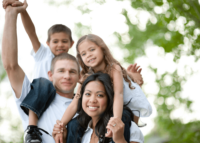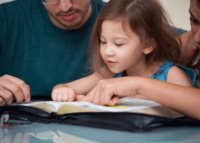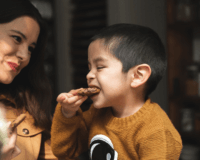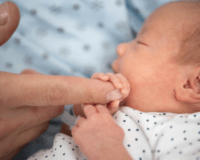Three things you can do to help your biracial kids grow into happy adults

My son went to his first birthday party when he was three. We knew he’d probably be the only brown kid there because the party guests were all from his preschool class, which was all white – except him. Ten minutes into the party, the host gathered the wiggly three-year-olds into a circle and explained the rules of Duck, Duck, Goose. The birthday girl went first and as she worked her way around the circle, tapping heads, I noticed that each time she arrived at my son’s head, she passed her hand over it, never touching it. She tapped the next kid’s head and the next and finally jubilantly shouted GOOSE! She took off around the circle, gleefully chased by the new kid up, and then breathlessly slid into the open spot, triumphant for having made it around. When this next child got to my son’s head, he too passed over it, refusing to touch it. Kid after kid did the same thing. Nine out of ten kids got to be Goose that day, all except my son.
I’ve seen so many memes to the effect, “Kids aren’t born racist; they are taught to be so.” I disagree. I am sure no parent sat their squirmy three-year-old down and said, “Now Johnny, don’t touch that little brown boy’s head!” Rather, these kids saw that my son was different, and they all subconsciously decided to avoid touching different. My son was invited to the party but never fully included.
Over the years, we’ve learned to do three things to help our biracial kids heal from slights like this and love all of who they are. If you have biracial kids, perhaps these will help you on your parenting journey.
Teach them their spiritual identity
First, we’ve taught them their spiritual identity.
All children were knit together in their mother’s womb by the Creator of the universe. They were bought with a price; they are joint heirs with Christ, accepted in the beloved. God loves them unconditionally and outfitted them with gifts and tendencies and personalities completely unique to them. No matter how anyone treats them, these truths never change. These should form our kids’ anchor, their true north, their refuge, the solid rock upon which they stand when everything around them is scary.
Teach them their ethnic histories
Second, our children need to be proud of their ethnic heritage.
Children should know who they are in Christ, and they also need to know who they are as humans living on earth. They aren’t spiritual beings, floating through life without a body. They have a body, and that body has a color and that is both wonderful and consequential. As Christians, we should never ignore that color or pretend it doesn’t exist, but rather, teach our kids that their color and other physical traits denote their ethnic heritage, or if they are mixed-race, their ethnic heritages, which are all wonderful, and all ordained by God.
My sons are African American, Jamaican, and Caucasian, and we’ve sought to help them to be proud of all of it. My Jamaican husband regales our sons with stories of the Maroons who are in his father’s line. The Maroons were enslaved Africans in Jamaica who refused to remain in bondage. They escaped and formed their own communities within the interior of the island. They were fierce and proud. My boys have heard the story of the heroine, Nanny, many times. She led the Maroons in a revolt against the British, and the British were so overwhelmed that they granted the Maroons five hundred acres of their own land, where they went on to thrive in freedom. It was called New Nanny Town and it still exists to this day.
My boys are proud to have Maroon blood flowing through their veins. When he was little, one of our sons needed to have painful dental work done, and he strengthened himself by saying, “I have to be brave; I’ve got Maroon in me!”
In the car and in the house, we play reggae, gospel, motown, classical music, and rock n roll. Our kids have their favorites, but they know the sounds of all of them. On many Saturdays, my husband takes over the kitchen and cooks Jamaican food and they enjoy eating it while often asking their (white) grandma questions about growing up during the depression and WWII years.
Perhaps in your case, a grandparent arrived from China speaking no English, or a Black uncle marched during the Civil Rights Movement, or a white grandfather fought in WWII. You can teach your kids how brave, persevering, and resilient these relatives were. In this way, they will take pride in both sides of their family. All of these stories make your kids who they are, and they are part of long, rich family lines.
Sadly, your kids will likely experience racism, but one of the ways you can buttress them against the toxic effects of racism is by teaching them to be proud of their diverse heritage.
Teach them to be proud of their ethnic heritage
The third thing our mixed kids need to know is that they can be proud of their heritage, whether you can see it in their skin or not. Perhaps your kids are Caucasian and Korean, but they look more Caucasian than anything else. That doesn’t matter. They should still own their Korean side, take pride in that culture, and understand some of its nuances. They can still identify as white and Korean, even if their traits are Caucasian and their Korean language skills aren’t great.
In other words, they can claim both parts of our heritage – no matter what they look like. Mixed kids struggle when they feel like they have to choose one side, because this feels like they’re choosing one parent over another and that is unsettling. It’s healthier for them to say, “I’m Black and white” or “I’m white and Chinese” or “I’m Black and Hispanic”– regardless of their skin tone, hair texture, eye shape or language skills.
It takes courage to do this, because there are gatekeepers of every culture, and these gatekeepers try to decide who is Black enough or Hispanic enough or white enough or Asian enough to allow in. But as parents, we should seek to raise mixed kids who have the confidence to fling wide the doors and walk in, to bring ALL of who they are to the table, knowing they belong there and that the God of the universe loves them and created them, exactly the way they are.
Consider a few extra resources:







